|
|
|
Sort Order |
|
|
|
Items / Page
|
|
|
|
|
|
|
| Srl | Item |
| 1 |
ID:
125600
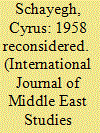

|
|
|
|
|
| Publication |
2013.
|
| Summary/Abstract |
Using Arabic, English, and French sources, and engaging Middle East and Cold War historians, this article makes a threefold argument. First, in United Arab Republic (UAR)-Syria, Jordan, and Lebanon, the 1958-59 explosion of domestic and regional tensions triggered state-formation surges. Second, these formed one process, which made those states more alike, with state-led socioeconomic planning playing a key role. Third, that process partook of a global Third World trend intersecting with the early Cold War. I draw three conclusions. Although existing scholarly readings that the events of 1958-59 in the Arab Middle East formed a crisis but not an ideological or political watershed are correct, from the viewpoint of state formation this crisis was a milestone. Moreover, UAR-Syria, Jordan, and Lebanon had persisting affinities and shared regional positions-notably, the fact that all were sandwiched between the unstable poles of the Arab state system, Iraq and Egypt-that shaped their individual postindependence histories of state formation. Last, Washington's low-profile involvement in this state-formation surge illustrates how domestic sociopolitics and regional geopolitics-including the UAR's peaking popularity and influence in 1958-59-affected U.S. policy in the Cold War postcolonial world.
|
|
|
|
|
|
|
|
|
|
|
|
|
|
|
|
| 2 |
ID:
118561
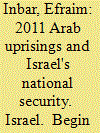

|
|
|
|
|
| Publication |
Israel, Begin - SadatCentre for Strategic Studies, 2012.
|
| Description |
29p.
|
| Series |
Mideast security and policy Studies no. 95
|
| Standard Number |
07931042
|
|
|
|
|
|
|
|
|
|
|
|
Copies: C:1/I:0,R:0,Q:0
Circulation
| Accession# | Call# | Current Location | Status | Policy | Location |
| 057125 | 327.0956/INB 057125 | Main | On Shelf | General | |
|
|
|
|
| 3 |
ID:
111690
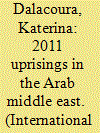

|
|
|
|
|
| Publication |
2012.
|
| Summary/Abstract |
The Arab uprisings of 2011 are still unfolding, but we can already discern patterns of their effects on the Middle East region. This article offers a brief chronology of events, highlighting their inter-connections but also their very diverse origins, trajectories and outcomes. It discusses the economic and political grievances at the root of the uprisings and assesses the degree to which widespread popular mobilization can be attributed to pre-existing political, labour and civil society activism, and social media. It argues that the uprisings' success in overthrowing incumbent regimes depended on the latter's responses and relationships with the army and security services. The rebellions' inclusiveness or lack thereof was also a crucial factor. The article discusses the prospects of democracy in the Arab world following the 2011 events and finds that they are very mixed: while Tunisia, at one end, is on track to achieve positive political reform, Syria, Yemen and Libya are experiencing profound internal division and conflict. In Bahrain the uprising was repressed. In Egypt, which epitomizes many regional trends, change will be limited but, for that reason, possibly more long-lasting. Islamist movements did not lead the uprisings but will benefit from them politically even though, in the long run, political participation may lead to their decline. Finally, the article sketches the varied and ongoing geopolitical implications of the uprisings for Turkish, Iranian and Israeli interests and policies. It assesses Barack Obama's response to the 2011 events and suggests that, despite their profound significance for the politics of the region, they may not alter the main contours of US foreign policy in the Middle East in a major way.
|
|
|
|
|
|
|
|
|
|
|
|
|
|
|
|
| 4 |
ID:
098112
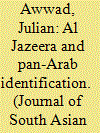

|
|
|
| 5 |
ID:
064596
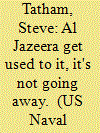

|
|
|
| 6 |
ID:
130313
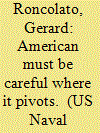

|
|
|
| 7 |
ID:
108328
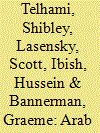

|
|
|
| 8 |
ID:
069275
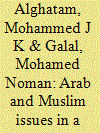

|
|
|
|
|
| Publication |
Manama, Bahrain Centre for Studies and Research, 2005.
|
| Description |
180p.
|
| Standard Number |
9990109605
|
|
|
|
|
|
|
|
|
|
|
|
Copies: C:1/I:0,R:0,Q:0
Circulation
| Accession# | Call# | Current Location | Status | Policy | Location |
| 051165 | 297.0953/ALG 051165 | Main | On Shelf | General | |
|
|
|
|
| 9 |
ID:
105665
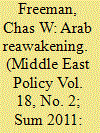

|
|
|
| 10 |
ID:
147226
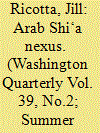

|
|
|
|
|
| Summary/Abstract |
The dramatic execution of prominent Saudi Shi‘i11. The words Shi‘a and Shi‘i in this article will follow their grammatical function in Arabic, where Shi‘i is the adjective and Shi‘a is the collective noun.View all notes Sheikh Nimr al-Nimr on January 6, 2016, spurred the official breakdown of Iran–Saudi Arabia relations. Other Arab countries, including Bahrain, have followed suit in breaking relations with Iran, which has only added to the now openly hostile sectarian regional environment.22. Ian Black and Saeed Kamali Deghan, “Bahrain, Sudan and UAE follow Saudis in diplomatic action against Iran,” The Guardian, January 4, 2016, http://www.theguardian.com/world/2016/jan/04/bahrain-cuts-diplomatic-ties-with-iran-in-row-over-saudi-execution-of-shia-cleric.View all notes As these sectarian tensions reach an all-time high in the region, the precarious status of Arab Shi‘a is at the very heart of this phenomenon. In Iraq, Saudi Arabia, Bahrain, and more recently Yemen, Arab Shi‘a have often been assumed to be vaguely Iranian influenced, explicitly backed by Iran, or even Iranians masquerading as Arabs.
|
|
|
|
|
|
|
|
|
|
|
|
|
|
|
|
| 11 |
ID:
108331
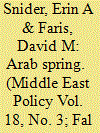

|
|
|
| 12 |
ID:
106659


|
|
|
|
|
| Publication |
2011.
|
| Summary/Abstract |
This study examines how Arab states have constructed national regulatory regimes for satellite television and telecommunications which undermine or inhibit the emergence of the three normative requisites for a civil political culture: freedom, equality and tolerance. Drawing on case studies of Jordan, Egypt and the UAE, the study argues that, by failing to be either self-limiting or to protect civil society from its uncivil components in the new communicative spaces provided by these technologies, the Arab states are attempting to reconstruct their own dominant (new) media spaces and so prevent the conditions which might foster democratic political cultures of civility.
|
|
|
|
|
|
|
|
|
|
|
|
|
|
|
|
| 13 |
ID:
092628
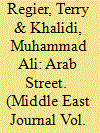

|
|
|
|
|
| Publication |
2009.
|
| Summary/Abstract |
Understanding Arab public opinion is central to the search for sustainable political solutions in the Middle East. The way Westerners think about Arab public opinion may be affected by how it is referred to in their news media. Here, we show that Arab public opinion is rarely referred to as such in the US media. Instead, it is usually referred to as the Arab street, a metaphor that casts Arab public opinion as irrational and volatile. We trace the origins of this metaphor to similar expressions in both English and Arabic, and note similarities and important differences between the English and Arabic usages. Ultimately, we argue that the Arab street metaphor misrepresents the Arab public, and invites dismissal of rather than engagement with Arab public opinion.
|
|
|
|
|
|
|
|
|
|
|
|
|
|
|
|
| 14 |
ID:
105664
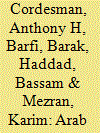

|
|
|
| 15 |
ID:
095117
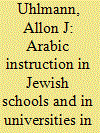

|
|
|
|
|
| Publication |
2010.
|
| Summary/Abstract |
Teaching is never merely a technical, pedagogical issue. This is especially true of Arabic teaching in Israel. Two related factors have conditioned the evolution of Arabic instruction in Israel in various, often contradictory ways. One is the Zionist modernist project of inventing a Jewish nation by bracketing off Jews from gentiles and reconstituting them as a distinct Hebraic ethno-linguistic community. The other is the project of securing historic Palestine as an exclusive national homeland for this newly invented nation and the consequent ambivalence toward Arab existence in historic Palestine. Both make up what I term Zionist sectarianism, and their influence on Arabic pedagogy has been decisive and pervasive, yet contradictory and unpredictable, demonstrating that although practice is always political, it is never mechanically reducible to its political underpinnings.
|
|
|
|
|
|
|
|
|
|
|
|
|
|
|
|
| 16 |
ID:
101573
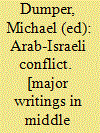

|
|
|
|
|
| Publication |
London, Routledge, 2009.
|
| Description |
4 Vol. Set.; p
|
| Contents |
Vol. 1: 1917-1967
Vol. 2: 1967-1991
Vol. 3: Major themes
Vol. 4: 1991-2007
|
| Standard Number |
978041544038, hbk
|
|
|
|
|
|
|
|
|
|
|
|
Copies: C:4/I:0,R:4,Q:0
Circulation
| Accession# | Call# | Current Location | Status | Policy | Location |
| 055620 | 956.94054/DUM 055620 | Main | On Shelf | Reference books | |
| 055621 | 956.94054/DUM 055621 | Main | On Shelf | Reference books | |
| 055622 | 956.94054/DUM 055622 | Main | On Shelf | Reference books | |
| 055623 | 956.94054/DUM 055623 | Main | On Shelf | Reference books | |
|
|
|
|
| 17 |
ID:
107081
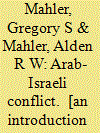

|
|
|
|
|
| Publication |
London, Routledge, 2010.
|
| Description |
ix, 302p.
|
| Standard Number |
9780415774604, hbk
|
|
|
|
|
|
|
|
|
|
|
|
Copies: C:1/I:0,R:0,Q:0
Circulation
| Accession# | Call# | Current Location | Status | Policy | Location |
| 056214 | 956.04/MAH 056214 | Main | On Shelf | General | |
|
|
|
|
| 18 |
ID:
092423
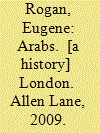

|
|
|
|
|
| Publication |
London, Allen Lane, 2009.
|
| Description |
vii, 533p.Hbk
|
| Standard Number |
9780713999037
|
|
|
|
|
|
|
|
|
|
|
|
Copies: C:1/I:0,R:0,Q:0
Circulation
| Accession# | Call# | Current Location | Status | Policy | Location |
| 054619 | 909.04927/ROG 054619 | Main | On Shelf | General | |
|
|
|
|
| 19 |
ID:
101799
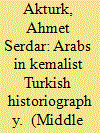

|
|
|
|
|
| Publication |
2010.
|
| Summary/Abstract |
Depictions of Arabs and Islam in the Turkish historiography of the 1930s clearly indicate the secular and nationalist character of the new Turkish republic. However, if one looks at the official publications from the 1930s and 1940s, not only the textbooks, the image of Arabs and Islam does not appear simple and coherent. This article reviews the image of Arabs and Islam in Kemalist Turkish historiography and demonstrates the diverse and sometimes conflicting depictions with reference to the various official texts.
|
|
|
|
|
|
|
|
|
|
|
|
|
|
|
|
| 20 |
ID:
126873
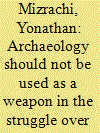

|
|
|
|
|
| Publication |
2011.
|
| Summary/Abstract |
The article presents the author's views concerning the political issue over the archaeological excavations and studies in Jerusalem. The author cites the decision of the city government to demolish 22 Palestinian dwellings in Silwan in order to construct the "Garden of the King" archaeological park. The author denotes how archaeology can mend the Israeli-Palestinian conflicts. The archaeology's implication on culture is also noted.
|
|
|
|
|
|
|
|
|
|
|
|
|
|
|
|
|
|
|
|
|